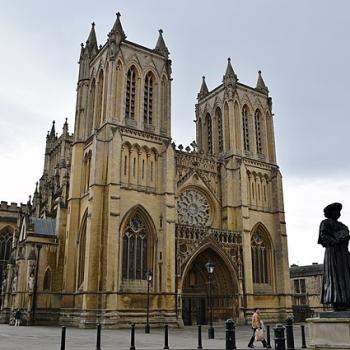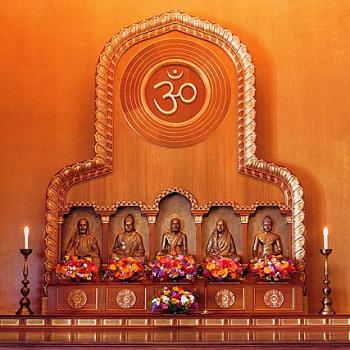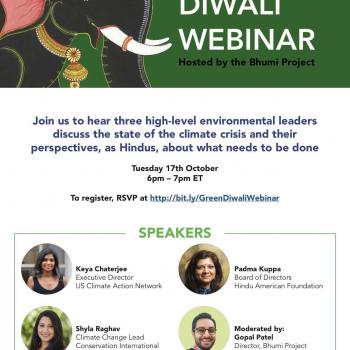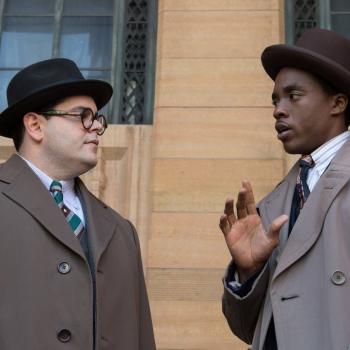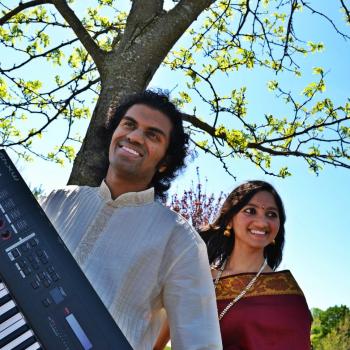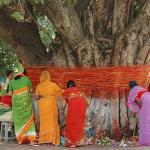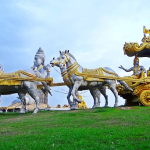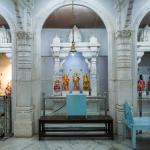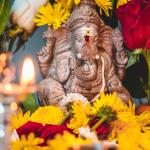In Season 2, episode 2 of National Geographic’s The Story of God, Morgan Freeman seeks answers to those often-expressed questions, “What is heaven? and “What is hell?” Looking up at a star-filled night sky, he starts by sharing with viewers what his grandmother taught him: Heaven is where “…good people go when they die,” and how she “warned him about the other place – where you go when you are bad.” Through the episode Freeman investigates various faith and spiritual traditions of heaven and hell, and says that “No matter what their faith, most people have faced these fears: what happens when we die.” He starts by descending “into the underworld of ancient Native Americans,” and continues around the world, showcasing vignettes of different people from various traditions. The concepts he evokes, framed from a Christian context, are rather separate from my understanding of Hindu cosmology, which includes multiple celestial realms, including swarga, where the heavenly abode of the Devas, or divine beings, and also a lower plane similar to hell, called naraka, a place of torment (a term used by Buddhists and Jains, as well as Hindus). This episode, while not necessarily fully engaging a Hindu’s spiritual understanding of the Western conception of heaven and hell, is similar to the others in the series. It provides a window into other traditions and encourages empathy towards them, so that a viewer can develop a pluralistic perspective.
“Do Hindus believe in heaven or hell?” is a question I have been answering for decades. This answer, from the Hindu American Foundation’s booklet of Frequently Asked Questions, has helped simplify my explanation ever since I discovered in nearly 10 years ago. (Full disclosure: I am now a Board member of the organization):
Because Hindus believe in karma and reincarnation, the concept of heaven and hell as worlds of eternal glory or damnation do not exist in Hinduism. Hindus also do not ascribe to the concept of Satan, or devil that is in eternal opposition to God.
[See What is karma? and Do Hindus believe in reincarnation? also in the booklet]
Some Hindus may believe in what is described in Hindu scriptures as two planes of existence that can be likened to heaven and hell. These are respectively svarga and naraka. Neither svarga or naraka, however, are permanent or eternal. Both are intermediary planes of existence in which the soul might exhaust a portion of its karmic debt or surplus before taking physical birth once again to strive for moksha.
[See What is moksha? also in the booklet]
In this episode, Freeman too tries to create an opportunity for viewers to understand more about Hinduism’s concepts around God, heaven and hell, by traveling to Cambodia. Angkor Wat is part of the UNESCO World Heritage Centre of Angkor, and is one of the most important archaeological sites in South-East Asia. Originally built by Khmer king Suryavarman II as a Hindu temple dedicated to Vishnu, Angkor Wat was converted into a Buddhist temple in the 14th century by Theravada Buddhist monk Srindravarman, who deposed his father-in-law, Hindu king Jayavarman VIII. Statues of Buddha were added to its already rich artwork, and it has now become Cambodia’s national symbol – appearing on its national flag, and its primary tourist destination. National Geographic Cultural Specialist David Brotherson and Cambodian scholar Syon Superovi are your guides through the temple. Although neither are identified as Hindus, they undertake the explanation of what heaven on earth is for a Hindu faith, amidst the backdrop of Freeman’s narrative. They climb the central tower – over 65 meters tall – and walk through this sacred space of more than 900 years – a layout that recreates the image of Mount Meru, a legendary place in Hindu mythology that is said to lie beyond the Himalayas and be the home of the gods. Brotherson clearly feels the centuries of divineenergy imbued in this iconic architectural site, and explains why Angkor Wat is so popular: “Even if you are not a spiritual person, you can feel the aura of this kind of place; we really are at heaven on earth.”
Perhaps that is what suits us best, to find heaven on earth – especially since belief in heaven and hell as absolutes is not as definitive as it used to be. According to trends reported by the Pew Forum on Religion and Public Life, Americans continue to believe in heaven (72% in 2014) more than in hell (58% in 2014) – but the trends for belief in either are downward. And drawing on a 2008 Harris poll that 24% of Americans believe in reincarnation, Lisa Miller of Newsweek said that Americans are becoming more Hindu in their outlook overall – it’s not about the afterlife, but working toward perfection within this one. And Freeman himself echoes the foundational pluralism of Hinduism, pointing out that “everybody’s truth is the Truth” and leads us to common ground: Whatever our understanding of heaven and hell, seeking heaven on earth is a universal human urge.
The Story of God with Morgan Freeman: Heaven and Hell
Premieres Monday, Jan. 23, at 9/8c
What are heaven and hell? Do they await us in the afterlife or are they here and now? People of all faiths and backgrounds have contemplated these conundrums for thousands of years. Morgan Freeman sets out to learn how these unseen places have changed the way we live, by descending into the ancient Native American underworld, investigating the phenomena of exorcisms and the gift of tongues, and meeting a woman who believes she has seen heaven.
Watch a clip from “Heaven and Hell”:



